
Subtext E-Newsletter Fall 2018

Hello from the Chair
By Dr. Charles Tung, Chair
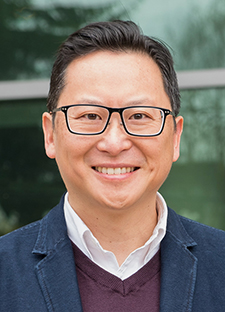 Greetings, friends and alumni of the English Department! As the new chair of English, I’m glad for this opportunity to reconnect with you in these troubling times, when the skills and insights of the humanities are needed more than ever—your ability to read critically and think historically, for instance, our deep archive of human situations, our urgent commitment to listen for voices that have not been heard. There is much to report from our various programs, as you will read below from our directors of Creative Writing, Film Studies, and the Writing Center, and much to report about our recent graduates. I’d like to introduce this year’s alumni newsletter by simply mentioning a few things about your faculty and what we look forward to in the coming year.
Greetings, friends and alumni of the English Department! As the new chair of English, I’m glad for this opportunity to reconnect with you in these troubling times, when the skills and insights of the humanities are needed more than ever—your ability to read critically and think historically, for instance, our deep archive of human situations, our urgent commitment to listen for voices that have not been heard. There is much to report from our various programs, as you will read below from our directors of Creative Writing, Film Studies, and the Writing Center, and much to report about our recent graduates. I’d like to introduce this year’s alumni newsletter by simply mentioning a few things about your faculty and what we look forward to in the coming year.
First, a quick overview of the 2017-18 news about some of your professors. Our long-serving chair Dr. Maria Bullón-Fernández has stepped down, having successfully guided the department for three terms. Our poet and Americanist Dr. Sharon Cumberland has retired after a long and successful career. Medievalist Dr. Kate Koppelman is returning to teach in the Department after serving as University Core Director. We hired two new faculty members in Film Studies, Drs. Benjamin Schultz-Figueroa and Alexander Johnston. Dr. Allison Machlis Meyer received tenure, and we’re grateful to her for spearheading efforts in student outreach, including taking charge of the Alumni Newsletter! Four of your faculty received major Seattle University awards and recognitions: Dr. Mary-Antoinette Smith received the Gaffney Chair; Dr. Christina Roberts was awarded the McGoldrick Fellowship; Dr. Molly Clark Hillard won both the A&S Outstanding Teacher Award and the SEC Advisor of the Year Award; and Dr. Hannah Tracy received the A&S Outstanding Contract Faculty Award. We hosted the second year of our Fulbright-related program, the Study of the US Institute on Contemporary US Literature, which brought 17 scholars and educators from around the world to Seattle U.
In 2018-19, we’ll be continuing our important conversations on how to teach more inclusively, an effort led by Dr. Roberts, Dr. Tracy, and Dr. Bullón-Fernández. This effort complements our curricular revisions, which Dr. Bullón-Fernández described in the last SUbtext. The Indigenous Peoples Institute, directed by Dr. Roberts, continues its important work in campus programming, student support, and community outreach. Thanks to Dr. Hillard, we’ll be hosting the Northwest Undergraduate Conference on Literature for the first time, a wonderful gathering of student research and creative work that the University of Portland is sharing with Seattle U. We’re also looking forward to the third issue of the Seattle U Undergraduate Research Journal, edited by Dr. Hillard and a number of English majors and Writing Studies students. The English department was again significantly involved in Seattle University’s Undergraduate Research Association (SUURA) Celebration of Student Scholarship, which this year was coordinated by Dr. Hillard in her new role as Director of the Student Research Program and featured twenty-eight presentations by English students. The department will have some exciting visiting writers this year, invited by CW Director Dr. Susan Meyers, and many of us are excited to attend English-Creative Writing alum Quenton Baker’s exhibit Ballast at the Frye Art Museum as part of our Welcome Night for new and returning majors. Dr. Kirsten Thompson’s Film Studies program has an exciting lineup of events for the campus community.
Every year we try to feature a student and an alum, but we know that these are just a sampling of the larger array of accomplishments and life paths that you and your classmates are working on. We want to hear what you’re up to, and we want to increase our connections between you and our current students. Please feel free to send an email to your professors with felicitations and news of how you’re doing. Send us a note at english@seattleu.edu! If you’re thinking about ways that you would like to support the department and its students, please do contact me at tungc@seattleu.edu.
Department News
Creative Writing Annual Update
By Dr. Susan Meyers, Director of Creative Writing
2017-2018 was both exciting and bittersweet for the Creative Writing Program, as we welcomed one new faculty member, Professor Juan Reyes, and celebrated the retirement of long-time faculty member, Dr. Sharon Cumberland. After more than twenty years, Dr. Cumberland left Seattle University amidst many fond memories and the launch of her latest book, Strange with Age. She will be sorely missed!
Amidst the celebrations last year, though, we were delighted to welcome Professor Juan Reyes, who, during his first year at Seattle U launched not one but two books: the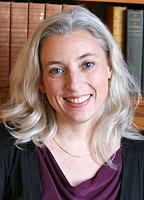 novella A Summer’s Lynching, which won the Quarterly West novella contest, and a short story collection called Elements of a Bystander just out from Arcadia Press. Professor Reyes also just became the managing editor for the literary journal Big Fiction—so there are sure to be more big things to come! Bringing this journal to campus will allow students to gain first-hand publishing experience with a professional journal. In addition, Professor Reyes will also begin serving as the faculty adviser for SU’s long-standing campus arts and literary journal, Fragments, so students will have ample opportunity to learn about careers in editing and publishing.
novella A Summer’s Lynching, which won the Quarterly West novella contest, and a short story collection called Elements of a Bystander just out from Arcadia Press. Professor Reyes also just became the managing editor for the literary journal Big Fiction—so there are sure to be more big things to come! Bringing this journal to campus will allow students to gain first-hand publishing experience with a professional journal. In addition, Professor Reyes will also begin serving as the faculty adviser for SU’s long-standing campus arts and literary journal, Fragments, so students will have ample opportunity to learn about careers in editing and publishing.
Last year, our community also welcomed two fantastic Distinguished Visiting Writers to campus. First, renowned memoirist Theo Nestor taught an innovative and highly popular course called “Writing the Self” in winter, followed by Seattle’s own Civic Poet, Anastacia Renee Tolbert, who taught an exciting and timely new course, “Poetry & Activism” in the spring. This year, we look forward to two more wonderful visitors: Washington State Poet Laureate Claudia Castro Luna, who will be joining us to teach a poetry course in the winter, followed by a return of the ever-popular Daemond Arrindel who will again teach his beloved slam poetry class for us.
Alongside all of this programming, our program director, Dr. Susan Meyers, continues her own work as well, introducing a new 2000-level course for creative writing majors, “Encountering Creative Writing,” speaking at three national and international conferences, and serving as writer-in-residence at two arts centers in Virginia and California. In addition, she was delighted to support several students applying to graduate schools this year, including students accepted to MFA programs as wide-ranging as Cork, Ireland and the prestigious University of Central Florida—with a full-ride Dean’s Graduate Fellowship. Congrats to our grads!
Film Studies Program Annual Update
By Dr. Kirsten Moana Thompson, Director of Film Studies
2017-2018 was an exciting year in Film Studies. Two new film faculty will be joining the Film Studies Program from the University of California, Santa Cruz. Alex Johnston (Ph.D. ‘17, Film and Digital Media) will be Assistant Professor of Film Production, while Benjamin Schultz-Figueroa (Ph.D. ‘18, Film and Digital Media) will be Assistant Professor of Film Studies.
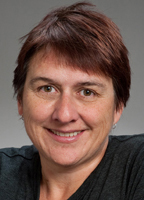
Last year, the Film Program hosted a number of stellar events and speakers. In collaboration with Northwest Screenwriting, we hosted Producer and creative consultant Wendy Kram, (Sony/Universal/Disney) and comic book/TV writer Brita Lundin (Riverdale, Ship It!). We also organized two special discussion seminars with guests from faculty and the film industry on the #MeToo Harvey Weinstein scandals.
Our program developed two new partnerships with the Tasveer (Southasian) Film Festival and the Social Justice Film Festival (SJFF). Through our new sponsored relationship with SJFF, we host screenings of the festival on campus each year, along with other shared activities, including student internships and curricular collaboration with the Social Justice Film Festival and the Duwamish Digital Quilt. This year’s theme was “Hope and Democracy”; SJFF launched on October 11th in collaboration with TWIST (LGBTQ fest) with a special themed program on Transgender and Race featuring a large selection of films exploring Black Lives Matter. The film “Change in the Family,” explored transgender and mixed race identities. On Oct 14, the program focused on art and children in “Go Penguins!” and sex trafficking in “The Turn Out.” Click here to see the full SJFF lineup.
Our Film program also had multiple screenings and discussions on campus, including Alvin Tsiang's Reunification (on immigration), Promised Land (on recognition of Salish tribes in the Northwest); Gabby Antonio Smashes the Imperialist, White Supremacist, Capitalist Patriarchy! (a woman of color's comedic approach to issues around race, class and power) and the comic-educational webseries The Secret Life of Muslims.
We also launched an ongoing research seminar series in collaboration with English Department faculty. Film contributions included John Trafton’s "A Land of Wolves: Sicario and the New Drug War Film," and Kirsten Moana Thompson’s "Contested Territories and Animated Surfaces in Moana from Flaherty to Disney."
Film sponsored the Seattle University Film Festival and the Bigfoot Seattle Film Institute with cofounder and SU instructor Jonathan Keasey. Our collaboration with the Bigfoot Seattle Film Institute also created the opportunity for Film to sponsor a new, uniquely Northwest scriptwriting competition, the Bigfoot Northwest Script Challenge, which offers unparalleled Hollywood access to the next great voices in screenwriting. The competition aims to raise Seattle’s profile as a filmmaking powerhouse as entrants compete for valuable exclusive fellowships with top industry professionals from the most famous studios in Hollywood.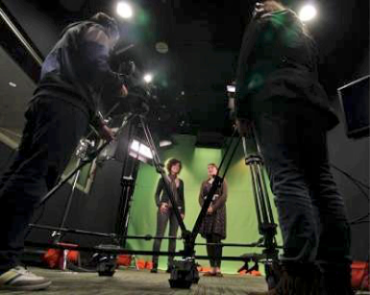 Students doing green screen work in the Media Production Center
Students doing green screen work in the Media Production Center
As part of the partnership, eight Seattle U Film Studies students are working as volunteer interns with Film Studies instructor and Hollywood screenwriter Jonathan Keasey on the new competition, including Henry Brown, Jillian Foote, Nils Gollersud, Nathan Graham, Mathew MacDonald, Eric Mura, Cade Taylor, and Amy Williams.
SU students can also enter and compete to win an opportunity for their scripts to be read by some of the top names in Hollywood, like Chris Lockhart, head of story at talent agency juggernaut WME, and John Cheng, President of Kevin Hart’s HeartBeat Productions, as well as many notables from Seattle’s vibrant indie film community. Students have the opportunity to learn more about the Hollywood business, network, and prepare for their professional careers after graduation. Top film-industry professionals will award two grand prizes and one runner up each in three categories: original screenplay, television pilot, and digital short. The awards will be announced at the Seattle Film Summit, scheduled for November 17 and 18, 2018.
The first fellowship announced is with the Paramount Studios’ company, Broken Road Productions, and producer Sean Robbins of Tom Cruise’s “Knight and Day” and Jeremy Renner’s upcoming movie, “TAG.” The programs are designed to advance the writer’s material and career. “Fellowships are a smart and relatively easy way to do something that’s extremely hard: get your work seen by someone who can actually make a difference,” says Mr. Robbins.
Seattle native, Writers Guild of America professional, and SU Visiting Professor of Screenwriting Jonathan Keasey is excited about the potential. “The Pacific Northwest has a pool of talent that hasn't been fully tapped. We're excited to bring our two creative communities together in hopes of generating some amazing content.”
Film Students and Alumni of Note
Film major Suzanne McAuley was accepted to MFA program in Writing and Producing for Television at Long Island University.
Megan Leonard ’12, SIFF Programming Coordinator and independent producer at Visual Pollution, recently interviewed Ethan Hawke as part of his visit and career award at the 2018 Seattle International Film Festival.
Writing Center Annual Update
By Dr. Hidy Basta, Writing Center Director
2017-2018 was a busy year for the Writing Center. We experienced the challenges of transitions and the joys of working collaboratively on different initiatives. We ended the year looking forward to re-envisioning the center and to expanding our services to SU community.
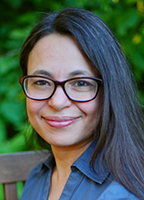 With a mix of sadness, deep gratitude, and good wishes, we said goodbye to writing center associate director, Jessica Ross at the end of Fall quarter. Ross has left the center to pursue her passion in developing her private writing business. We owe her deep gratitude for her tireless work and dedication to the center. We deeply cherish the lessons she has left with us and wish her all the best in her continued career of supporting writers.
With a mix of sadness, deep gratitude, and good wishes, we said goodbye to writing center associate director, Jessica Ross at the end of Fall quarter. Ross has left the center to pursue her passion in developing her private writing business. We owe her deep gratitude for her tireless work and dedication to the center. We deeply cherish the lessons she has left with us and wish her all the best in her continued career of supporting writers.
In winter, we conducted a successful search leading to the hiring of Alex Smith who has joined the writing center as a part-time assistant director this spring. Alex has brought a rich focus to undergraduate writing and research. Her teaching experience, administrative work, and dedication to undergraduate interdisciplinary scholarship made her a perfect fit for our writing center community.
We have also celebrated the news of adding 25K to our student employees’ budget. This allowed us to restore our staffing hours to meet the increasing demands of our clients.
At the end of spring, we welcomed a cohort of ten new writing consultants making our team a total of 25 writing consultants and office assistants. During summer, we geared up to pilot two new services: we started to offer consultations to faculty members who are working on their writing prompts. In these consultations, our undergraduate peer consultants offer insights that are grounded in their experience as students and as consultants who work with students unpacking these prompts. We are also delighted to offer online writing consultations on limited basis this fall. Starting Oct 8, students now can submit papers online, receive written feedback from a peer writing consultant within two working days, and have the option to follow up with virtual or in-person consultations. The writing consultants are starting a Blog to share writing tips and resources. We are looking forward to what the coming year may bring. Stay tuned with our news and update on our webpage and FB.
Dr. Sharon Cumberland's Retirement
By Dr. María Bullón-Fernández
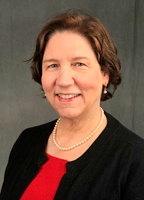 Last Spring the Department celebrated Dr. Cumberland’s retirement and the many years she has dedicated to all of us as a colleague, teacher, poet, literary critic, and friend. Dr. Cumberland joined Seattle University and the English Department in 1994 as an Assistant Professor. Throughout the years, she taught numerous courses in her two specialties, American Literature and Creative Writing, both in the major and in the Core. As a teacher, she was known for the creativity and passion she brought to her classes. She was the first faculty in the Department to teach creative writing in the context of new media; she also taught the Graphic Novel and an innovative course on orality and literacy titled “From Homer to Hypertext.” She created a Passport to the Arts program that took students all over our city to experience the arts and took hundreds of students to the opera through the Front and Center program at Seattle Opera. This effort was made possible by an annual grant she received from the Nauheim Straus Charitable Foundation. Dr. Cumberland's extensive mentoring and advising of students was recognized in 2013, when she received the Arts and Sciences Student Council Advisor of the Year Award.
Last Spring the Department celebrated Dr. Cumberland’s retirement and the many years she has dedicated to all of us as a colleague, teacher, poet, literary critic, and friend. Dr. Cumberland joined Seattle University and the English Department in 1994 as an Assistant Professor. Throughout the years, she taught numerous courses in her two specialties, American Literature and Creative Writing, both in the major and in the Core. As a teacher, she was known for the creativity and passion she brought to her classes. She was the first faculty in the Department to teach creative writing in the context of new media; she also taught the Graphic Novel and an innovative course on orality and literacy titled “From Homer to Hypertext.” She created a Passport to the Arts program that took students all over our city to experience the arts and took hundreds of students to the opera through the Front and Center program at Seattle Opera. This effort was made possible by an annual grant she received from the Nauheim Straus Charitable Foundation. Dr. Cumberland's extensive mentoring and advising of students was recognized in 2013, when she received the Arts and Sciences Student Council Advisor of the Year Award.
In addition to her dedication to teaching, Dr. Cumberland made a mark on our university by serving in leadership positions. She was the Director of the Creative Writing Program from 2009 to 2015. As Director she organized and sponsored two major regional conferences, the Cascadia Poetry Festival in 2015, and the "New Media in Old Disciplines" conversation for directors of creative writing programs. Among other significant service tasks she took on over the years, she served on the College Rank and Tenure Committee and chaired the Arts and Sciences Curriculum Committee. For her generous service activities, she was granted the Arts and Sciences Service Award. Beyond our university, Dr. Cumberland has served our community, most notably, by founding The Greenwood Poets at the Greenwood Senior Center, 2004-present, a free class and workshop in poetry writing, revision, and publication for seniors.
Dr. Cumberland has also been a productive scholar and creative writer since she came to SU, publishing academic articles and, most especially, writing and publishing numerous poems in leading poetry magazines as well as producing three poetry collections. The most recent one is titled Strange with Age and was published by Black Heron Press in 2017. Dr. Cumberland is regularly asked to give poetry readings and participate as a judge in literary competitions throughout our region.
In her retirement years, Dr. Cumberland will stay in Seattle and also do some traveling. She and her husband are planning to visit the Greek Islands in 2019 and do a Viking River Cruise to Holland and Brussels in 2020. She will continue to develop two great interests of hers. For thirty years she has collected Union cases--thermoplastic (gutta percha) cases and leather cases that protect and display daguerreotypes, ambrotypes and tintypes. She is a member of the Daguerreian Society and hopes to attend their annual meeting in NYC. As a related project, she also plans to attend the Rare Book School at the University of Virginia this coming summer to take a week-long course on "The Identification of Photographic Print Processes." She will also continue to meet with the Greenwood Poets every week and continue doing readings around the region as well as teach poetry sessions at various arts festivals. And, of course, she will continue to write. We, her colleagues in English gave her a retirement gift of a class at Hugo House in the winter term to re-enter the world of a novel she started on her last sabbatical. She plans to finish it and we look forward to reading it!
 Left: An example of Dr. Cumberland's union cases which protect and display daguerreotypes, ambrotypes and tintypes
Left: An example of Dr. Cumberland's union cases which protect and display daguerreotypes, ambrotypes and tintypes
I asked Dr. Cumberland if she would like to share some reflections on her years at Seattle University and this is what she asked me to share with you:
"I was so very, very fortunate to have been hired for a tenure-track position at Seattle University in 1994. As graduate of the City University of New York Graduate Center, and as a former novice in the Order of St. Helena (Episcopal), it meant everything to me to be teaching in a Jesuit university where education is rigorous, where my own belief system is honored, and where all students are treated with respect and equality. I was able to progress with the support of many wonderful colleagues, through tenure and promotion to associate and then full professor, and am now an emeritus professor--so I will be connected to Seattle U. for the rest of my life. The unexpected benefit of this job was living in the city of Seattle, where I bought a home, met my husband, lured my niece to come work for Amazon after college (where she met her husband and now has three kids!) and where my sister has retired. I came out here from New York by myself, and now have a thriving family around me! I also have a community of former students who are thriving as poets, novelists and teachers--Karyna McGlynn, Abby Murray, Lish McBride, to name a few. I would love to hear from any of my former students--I'm still here for you, ready to write recommendations for grad school, artists' colonies, and book blurbs. Once your prof, always your prof!"
Dr. Cumberland will be greatly missed by her colleagues and students. We will miss her as a colleague, teacher, and friend. We will also miss her creative use of language, which she brought to her conversations with students and colleagues. Like a true poet, Dr. Cumberland makes you see things in unexpected ways. She wrote a poem to the students in the last poetry class she taught, which she is also happy to share with all her students and alums:
TO MY STUDENTS AS I RETIRE
Like snowflakes or blades of grass
from one horizon to the next
you collect into a landscape
through the passing arc of time.
Yet every day you flow like water—
a stream that parts around a rock.
How can similes be anything
but mixed describing you—
a rush of tumbling pebbles
forever fresh, forever new?
Your faces change,
your interests shift,
your clothing veers
through increments
from cute to strange.
Conditions shift:
your brains adapt
through paradigms
of change that neither rock
nor stream anticipates.
Yet through it all
you carve new canyons,
grow new forests, flow
to different worlds. The rocks
you leave behind stay put,
like the firm earth that turns.
We are forever here,
forever gone, forever
common landscapes,
rock or water, old or young.
—Sharon Cumberland
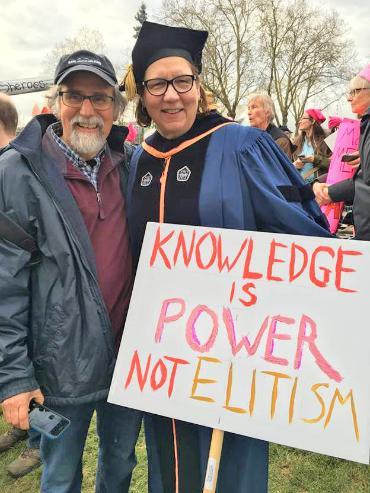
Dr. Cumberland and Dr. Erik Olsen at the Women's March in 2017
The English Department Welcomes New Faculty this Fall
Film Studies Professor Dr. Benjamin Schultz-Figueroa
By Shea Taisey
Dr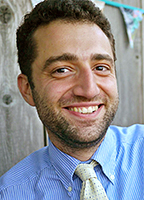 . Benjamin Schultz-Figueroa joins Seattle University’s Film Studies program from Santa Cruz, CA, this fall. One of two new tenure-track hires in the program, his research concentrates on the history of scientific filmmaking, nontheatrical film, animal representations on film, and the genres of science fiction and horror.
. Benjamin Schultz-Figueroa joins Seattle University’s Film Studies program from Santa Cruz, CA, this fall. One of two new tenure-track hires in the program, his research concentrates on the history of scientific filmmaking, nontheatrical film, animal representations on film, and the genres of science fiction and horror.
A film historian and theorist, Schultz-Figueroa earned his PhD in Film and Digital Media from the University of California, Santa Cruz, and his MA in Media Studies from The New School. In addition to practicing filmmaking – creating experimental documentaries that have screened both nationally and internationally – he is a regular contributor to The Brooklyn Rail film section, and has curated screenings for venues such as Light Industry, Anthology Film Archives, and Artists’ Television Access.
Schultz-Figueroa’s research has been channeled into numerous types of imminent publications. In the book Viscera, Skin, and Physical Form: Corporeality and Early Cinema, he discusses the connections between the Victorian visual culture of physiology and early debates about filming vivisections. The winter edition of Film History will feature his article examining the influence of rat experiments on the use of educational media in the 1950s, and the summer 2019 edition of Cinema Journal will include his essay discussing analysis of the multiple uses of film in B.F. Skinner’s World War II research into pigeon-guided missiles.
While glad to be joining the Seattle U community as a whole, Schultz-Figueroa is particularly eager to collaborate with his fellow incoming Assistant Professor in the Film Studies program, Alex Johnston, to find new ways for students to simultaneously make and study films. He states that he is especially excited to have the opportunity to investigate what earning a degree in Film Studies looks like at a time when foundational definitions of the medium seem to be changing dramatically.
“What do we need to teach incoming students now that moving images play a significant role in our moment-to-moment experiences, from the doctor's office, to the bus stop, to the battlefield?” he asks. “I look forward to exploring the answer to this and related questions in the interdisciplinary liberal arts environment of Seattle University, and with my excellent new colleagues and students in the English Department.”
Film Production Professor Alexander Johnston
By Shea Taisey
Also coming to SU from Santa Cruz, Dr. Alexander Johnston joins us this fall as our new professor of Film Production. He earned his Master’s Degree in Social Documentation and his PhD in Film and Digital Media, both from the University of California, Santa Cruz. These production- and practice-based programs helped to shape his passions as a producer, scholar, and social justice advocate.
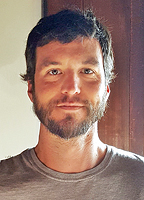 Johnston says he arrived late to the fields of film studies and media production, after spending years working as a prisoner’s rights activist. His work focuses on media representations of race, class, and gender issues, and is broadly categorized as experimental. Johnston’s research is centered on the relationship between professional sports and the prison system.
Johnston says he arrived late to the fields of film studies and media production, after spending years working as a prisoner’s rights activist. His work focuses on media representations of race, class, and gender issues, and is broadly categorized as experimental. Johnston’s research is centered on the relationship between professional sports and the prison system.
Having his work be both accessible and legible within and beyond the film studies realm, and academia as a whole, is a top priority. “This means producing media that operates on multiple levels, such that it can be appreciated as much by a documentary studies scholar as it can by an activist organizing a community screening,” Johnston says. He is eager to share his research focuses and creative processes with SU’s students, but also to learn more about our students’ own approaches and interests.
Johnston looks forward to contributing to the continuing growth of the film production curriculum, collaborating with colleagues, and building relationships between the Film Studies program and the various film communities of the Pacific Northwest.
“I am excited to bring a range of creative and scholarly interests to Seattle University, encompassing overlapping discourses of both content and form,” says Johnston. “On a theoretical level, this includes an analysis - through both media production and scholarship - of documentary ethics, history, and production, and the politics and aesthetics of experimental and new media forms… I can’t wait to begin working with all of the brilliant students at SU!”
Writing Center Assistant Director Alex Smith
By Dr. Hidy Basta, Writing Center Director
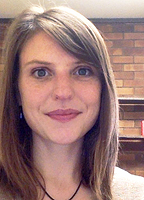 New Assistant Director Alex Smith is currently finishing up her PhD in English Language and Literature at the University of Washington where her research focuses on twentieth century multi-ethnic literatures of the United States. Smith is specifically interested in literatures that take up “the street” and urban space and how this “street lit” uses the literary form to reclaim and/or make anew the use value of the street. In addition to teaching high school English in Sacramento, she has taught several courses in composition and literature in the English department at UW. Smith has also served as an Assistant Director in UW’s Expository Writing Program where she worked as a liaison between the university and Washington area high schools. Alex’s dedication to and passion for mentoring undergraduate students in multidisciplinary scholarship is evident throughout her career. Smith is a founding member of and current editor-in-chief for Process: Journal of Multidisciplinary Undergraduate Scholarship, an online journal that publishes undergraduate work from around the world. In her spare time, Alex enjoys traveling around the world, eating good food, and making her way through the giant stack of books on her nightstand.
New Assistant Director Alex Smith is currently finishing up her PhD in English Language and Literature at the University of Washington where her research focuses on twentieth century multi-ethnic literatures of the United States. Smith is specifically interested in literatures that take up “the street” and urban space and how this “street lit” uses the literary form to reclaim and/or make anew the use value of the street. In addition to teaching high school English in Sacramento, she has taught several courses in composition and literature in the English department at UW. Smith has also served as an Assistant Director in UW’s Expository Writing Program where she worked as a liaison between the university and Washington area high schools. Alex’s dedication to and passion for mentoring undergraduate students in multidisciplinary scholarship is evident throughout her career. Smith is a founding member of and current editor-in-chief for Process: Journal of Multidisciplinary Undergraduate Scholarship, an online journal that publishes undergraduate work from around the world. In her spare time, Alex enjoys traveling around the world, eating good food, and making her way through the giant stack of books on her nightstand.
Departmental Honors
By Dr. Molly Clark Hillard, English Departmental Honors Coordinator
The English Department Honors Program was lead this year by Dr. Molly Clark Hillard. Dr. Charles Tung ran the program for six years prior to this.
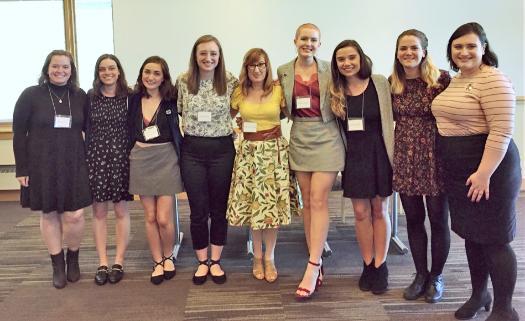
Dr. Hillard with 2018 Departmental Honors cohort after a successful SUURA.
In 2017-2018, eight English Department students completed honors theses under the direction of their faculty mentors. Thanks to the generosity of the Department, Dean, and the university’s Student Research Program, four Departmental Honors students (and four other students in the department) presented work at the University of Portland’s Northwest Undergraduate Conference on Literature, a conference to which the English Department regularly sends delegates, and which the SU English Department will host in 2019. Finally, all eight English Department Honors students presented their Honors projects at the Seattle University Undergraduate Research Association conference (SUURA) in May.
The students and their faculty mentors were:
- Avalon Ashley/Dr. Susan Meyers
- Emily Boynton/Dr. Molly Clark Hillard
- Madeline Corbin/Dr. Christina Roberts
- Alexandra Forrest/Dr. Mary-Antoinette Smith
- Danae Golding/Dr. June Johnson
- Natalie Langdale/Dr. Allison Machlis Meyer
- Jenna Ramsey/Dr. Molly Clark Hillard
- Katelynn Tefft/Dr. Susan Meyer
Students were honored for completing their honors theses at the College of Arts and Sciences annual awards ceremony.
Departmental Honors students often go on to graduate school and other exciting forms of work. We’d love to hear your story of where you are in your life and work now. Please email us so that we can share your good news!
A Second Successful Year for the Study Of The U.S. Institute On Contemporary American Literature (SUSI)
By Dr. Charles M. Tung
This year we had the pleasure of hosting our second Study of the US Institute on Contemporary US Literature, a six-week Fulbright-related program that brought scholars and educators to Seattle University from Algeria, Belarus, Brazil, Cameroon, Chile, India, Indonesia, Israel, Mongolia, Nepal, Pakistan, Slovak Republic, Suriname, Thailand, Togo, Tunisia, Turkey, and Ukraine.
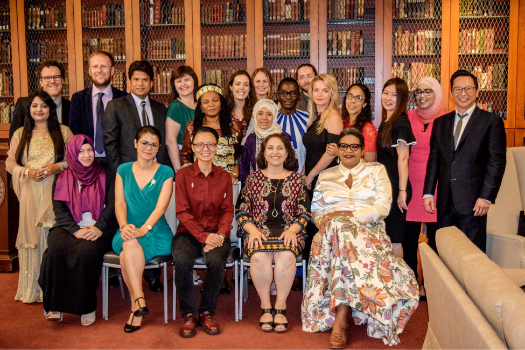
Dr. Tung with 2018 SUSI participants and faculty.
A number of Seattle U faculty led seminars: Dr. Christina Roberts on Indigenous literatures; Dr. Jen Schulz on literature as map; Dr. Ben Stork on Blade Runner; Dr. Nalini Iyer on Ayad Akhtar’s Disgraced; Dr. Ken Allan on American art from WWII to the present; Dr. John Bean and Dr. June Johnson on course design and curriculum revision; and Dr. Juan Carlos Reyes, Dr. Sonora Jha, and visiting writer and Seattle Civic Poet Anastacia-Reneé Tolbert on creative writing. Additionally, we enjoyed seminars led by distinguished professors from other universities: three named chairs in literature, colleagues from U Washington, professors from Florida State, Rice, Georgetown, U Maryland, Hamilton, Stanford, and Berkeley.
For more on the SUSI: https://www.seattleu.edu/artsci/about/news/news-2017/study-of-the-us-institute-for-scholars-susi-on-contemporary-american-literature.html
For more photos of the Institute: https://business.facebook.com/media/set/?set=a.10156627991746337.1073741835.334119876336&type=1&l=267d781920
SUURJ Launches Volume 2
By Dr. Molly Clark Hillard
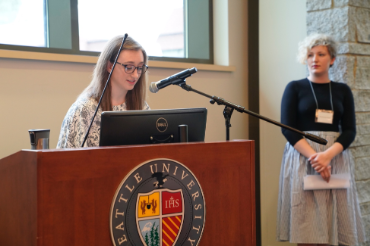
Editors Danae Golding and Mackenzie Reed launch Volume 2 of SUURJ at Seattle U Undergraduate Research Association conference (SUURA).
In May of 2018, the Seattle University Undergraduate Research Journal (SUURJ) launched its second volume. Led by Chief Faculty Editor Dr. Molly Clark Hillard, the journal is a joint venture of the English Department, the College of Arts and Sciences, and the Office of the Provost, with additional support from Lemieux Library and the University Core.
The journal is a co-curricular, year-long journey; student editors gain editing and publishing experience for class credit, and student authors undergo a rigorous revision process with both student and faculty mentors.
This year, the journal had 14 students in the editing cohort in fall quarter, representing a diversity of majors; 11 students went on to edit and produce Vol. 2 to completion, with 10 faculty content editors working with them to shape final essays. Student editors and the faculty advisory board accepted 10 essays accepted from seven majors and the Core: mechanical engineering, interdisciplinary studies, psychology, biology, theology and religious studies, international studies, and philosophy. Those essays cover topics such as: media bias towards protestors, middle school service learning, effects of heavy metal pollution on crustaceans, dream recollection, and civil disobedience.
Said Volume 2 editor Mackenzie Reed, an English major and Writing Studies minor (’18), “I'm so incredibly grateful for my involvement with SUURJ. It gave me confidence in myself and my future and set me on a path to truly finding what I'm most passionate about.” Volume 1 contributor Jesse Goncalves, Math major and Writing Studies minor (’19) so enjoyed his publication process that he joined SUURJ in 2018 as an editor. He says, “As an author, SUURJ meant an opportunity for my work to go through a thorough revision process and be seen by an audience beyond my professors and classmates. Upon joining the editorial team, SUURJ has become a project that I feel ownership over and a community of which I am an integral part.”
The journal has received special commendation from President Steven Sundborg, and from then-Interim Provost Bob Dullea.
To read all the essays and learn more about SUURJ, visit the journal’s webpage, here.
Northwest Undergraduate Conference in Literature (NUCL) Comes to Seattle U in March 2019
By Dr. Molly Clark Hillard
The Northwest Undergraduate Conference in Literature (NUCL) is a regional conference for college students and advanced high school students that was created by and has taken place at the University of Portland for 15 years. Under the directorship of Dr. Molly Hiro and Dr. Joshua Swidinski of the UP English Department, the conference has long enjoyed and deserved its excellent reputation among regional universities and high schools. The conference draws participants from universities and high schools throughout the West Coast: Washington, Oregon, California, and even Nevada, Montana, and Idaho. Last year, in recognition of our long-standing attendance at the conference and our students’ excellence as presenters, the UP English department invited the Seattle University English department to be a guest organizer of the conference in winter 2019. We were delighted and honored to accept!
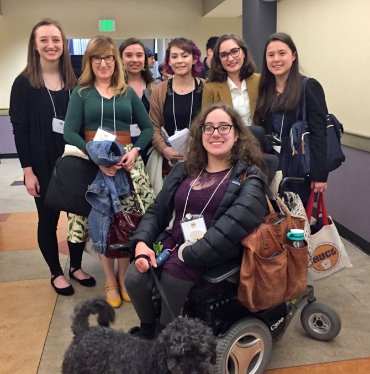 Dr. Hillard with students presenting at NCUL
Dr. Hillard with students presenting at NCUL
This March 23, 2019, NUCL will take place on the Seattle U campus. The conference affords exciting opportunities in campus partnership. First, the department will award internships to two students, who will become the assistants for the conference, where they will gain valuable on-the-job professional development. Second, because the conference includes presentations from students at local high schools, the conference offers an exciting recruitment opportunity. Additionally, the department will collaborate with Lemieux Library to host a curated viewing of items from Special Collections, including a medieval illuminated manuscript and our first edition volume of Charles Darwin’s Origin of Species. Finally, the NUCL conference will welcome a campus- and community-wide audience to a public keynote lecture (Past NUCL keynote lectures have included such literary dignitaries as Dr. Kenneth Warren, renowned scholar of African American studies at University of Chicago.)
We welcome our alumni to this exciting event, so mark your calendars!
Have you presented at a past NUCL conference? Did you find it valuable for your professional or scholarly formation? Would you like to donate to the NUCL conference this year—perhaps to the prize fund or to the speaker’s fees?
If you would like to become an alumni donor to support the conference, please email us at english@seattleu.edu.
Awards
By Dr. Allison Machlis Meyer
English Department Faculty and Students were recipients of a number of prestigious College of Arts and Sciences and University awards in 2017-2018:
Dr. Mary-Antoinette Smith was appointed the Reverend Louis Gaffney, S.J. Chair for 18-20. The Gaffney Chair is made possible by the Jesuit community at Seattle University. It promotes issues related to the Jesuit commitment to faith that does justice and supports the Jesuit ideal of teaching. Dr. Smith’s topic, “Tender Mercies: Moving from a Kaírós of Mercy to Creating the Beloved Community for a Just and Humane World,” is “inspired by the complementary global visions of Pope Francis and Dr. Martin Luther King, Jr.”
Dr. Christina Roberts was awarded the James B. McGoldrick, S.J. Fellowship for 18-19. The McGoldrick fellowship is the most prestigious award conferred upon SU faculty. Named for a legendary Jesuit who devoted a half century of his life to Seattle University, the fellowship recognizes an extraordinary faculty member who embodies the mission and values of our institution.
Dr. Molly Clark Hillard was named CAS Student Executive Council Advisor of the Year 17-18. The SEC is a student advisory board to the Dean of the College of Arts and Sciences. Undergraduate students on the board each represent a different department in the College of Arts and Sciences as well as the student body as a whole, and they select outstanding faculty, staff, and advisors for their annual awards through a nomination process.
Dr. Molly Clark Hillard was awarded the CAS Outstanding Teaching Award 17-18. The Outstanding Teaching Award recognizes the successful embodiment of the Jesuit and Catholic ideal of liberal education by a colleague whose courses are recognized by students and faculty alike as being uncommonly rigorous and challenging, and whose delivery of these courses is again recognized by students and faculty members as having a major impact on the intellectual, spiritual, and/or personal development of the students.
Dr. Hannah Tracy was awarded the CAS Outstanding Contract Faculty Award 17-18. The Outstanding Contract Faculty Award recognizes a colleague in a full-time non-tenure track position who has made an outstanding contribution in a combination of areas, including Teaching, Scholarship or Service. Dr. Tracy’s multiple challenging courses for the Core, her deep reflective practice and commitment to social justice, and her role on the Faculty and Staff Senate, where she has been a steady advocate on behalf of non-tenure track faculty, were commended by the selection committee.
English and Anthropology major Jillian Guillermo received the 2018 Hickey Award, given to an outstanding graduating student of the College of Arts and Sciences. Hickey award winners are presented with a medal at the Arts and Sciences Undergraduate Awards Ceremony and also have the privilege of leading their class in the processional at graduation. Selection is based upon the student's total contribution to academic life and is made by the department chairs and program directors of the College. The award honors the memory of Dr. Richard P. Hickey, professor of English, a beloved and respected teacher at Seattle University from 1947 until his death in 1968.
In English, Emily Boynton and Garth Ball received the Department’s McDonald Award. In Film, Cade Taylor received the McDonald Award. It is named in honor of former chair and distinguished professor Fr. Alex McDonald, S.J., and is presented to the graduating student with the highest GPA in the major.
In addition to her Gaffney appointment, Dr. Mary-Antoinette Smith also won first prize in the "Imagining the World" photo contest for study abroad submissions with her photo titled "Wonder-Gazing While Wounded," which you can view here:
Featured Student: Jillian Guillermo, ‘18
By Dr. Allison Machlis Meyer
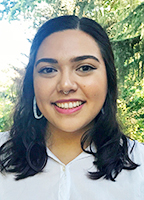 Jillian Guillermo graduated with double majors in English and Anthropology in Spring Quarter 2018. She was a four-year recipient of Seattle University’s merit-based Trustee Scholarship and the 2018 winner of the College of Arts and Sciences Hickey Award, which is awarded to an outstanding graduating student based on their total contribution to academic life. During her time as an SU English major, Jillian served as the Seattle University Center for Community Engagement Youth Initiative’s K-12 Lead, where she tutored elementary students from diverse cultural backgrounds in supplementary math and literacy coursework at Bailey Gatzert Elementary School. Teaching at Bailey Gatzert helped her develop a passion for working with younger students, and showed her that such work can be “rigorous, engaging, and profound.” Jillian presented her own research on Junot Diaz at Seattle U’s Undergraduate Student Research Association’s (SUURA) Celebration of Student Scholarship, and she credits her English degree with giving her important analytical tools for her future endeavors. “Looking back on my first day of freshman year to the present,” Jillian says, “I see that I’ve developed a much more critical eye and learned why it is so important to work toward positive change and inclusive practice. My English classes helped me practice that and helped me be in dialogue with my peers in the process.”
Jillian Guillermo graduated with double majors in English and Anthropology in Spring Quarter 2018. She was a four-year recipient of Seattle University’s merit-based Trustee Scholarship and the 2018 winner of the College of Arts and Sciences Hickey Award, which is awarded to an outstanding graduating student based on their total contribution to academic life. During her time as an SU English major, Jillian served as the Seattle University Center for Community Engagement Youth Initiative’s K-12 Lead, where she tutored elementary students from diverse cultural backgrounds in supplementary math and literacy coursework at Bailey Gatzert Elementary School. Teaching at Bailey Gatzert helped her develop a passion for working with younger students, and showed her that such work can be “rigorous, engaging, and profound.” Jillian presented her own research on Junot Diaz at Seattle U’s Undergraduate Student Research Association’s (SUURA) Celebration of Student Scholarship, and she credits her English degree with giving her important analytical tools for her future endeavors. “Looking back on my first day of freshman year to the present,” Jillian says, “I see that I’ve developed a much more critical eye and learned why it is so important to work toward positive change and inclusive practice. My English classes helped me practice that and helped me be in dialogue with my peers in the process.”
This fall, Jillian began her Masters in Teaching at Seattle University. In the first few weeks of class, her MIT cohort has had extensive conversations about what equitable education and equitable teaching look like, conversations that her English and Anthropology degrees helped prepare her to engage in: “I learned as an undergraduate to be conscious of who writes the texts we read, and who holds the power in discussion about what needs to be done in the classroom.”
Reflecting on her undergraduate experience, Jillian identifies connecting with the Seattle Filipino community as an important part of her time at Seattle University. As a member of Seattle University’s United Filipino Club, Jillian performed in the annual Barrio Fiesta Event and served as decorations co-chair. Through the Northwest Filipino-American Student Alliance, Jillian also presented three interactive workshop sessions, “Kamayan: Taking Liberation into our Own Hands,” as part of the Alliance’s annual conference at the University of Washington-Bothell. “One of the reasons I was able to feel successful here at Seattle University is that I also felt grounded in a community of people who reflected my community back home in Hawaii.”
Featured Alumna: Janna Haider ‘15
By Dr. Allison Machlis Meyer and Rachel Fromherz
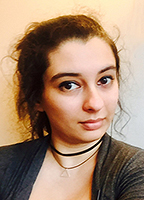 Janna Haider graduated from Seattle University with Majors in English, Criminal Justice, and Political Science in 2015. She is currently completing her Master’s degree in South Asian Studies through the University of Washington’s International Studies Program, an area of study she was initially drawn to because of her South Asian heritage. Her original interests in South Asian Studies circled around the impact of secession on nationalism in Bangladesh and Pakistan, before a geography class changed her course of thought and she began a “deep dive into the immigration history of South Asians into the US.” Exploring this history led her to an interest in the state surveillance of political activities, which brought Janna to her more clearly defined current research topic, studying “how state surveillance and immigration laws create racialized subjects.” Janna has an acute awareness of the relevance of her work to current national and global politics. “The PhD project that I want to do focuses a lot on immigration law and state surveillance side by side,” Janna says, but “when I came up with this research question it was kind of before a lot of this” was dominating headlines and part of our current political climate. “Now it’s clear—this matters a lot right now.”
Janna Haider graduated from Seattle University with Majors in English, Criminal Justice, and Political Science in 2015. She is currently completing her Master’s degree in South Asian Studies through the University of Washington’s International Studies Program, an area of study she was initially drawn to because of her South Asian heritage. Her original interests in South Asian Studies circled around the impact of secession on nationalism in Bangladesh and Pakistan, before a geography class changed her course of thought and she began a “deep dive into the immigration history of South Asians into the US.” Exploring this history led her to an interest in the state surveillance of political activities, which brought Janna to her more clearly defined current research topic, studying “how state surveillance and immigration laws create racialized subjects.” Janna has an acute awareness of the relevance of her work to current national and global politics. “The PhD project that I want to do focuses a lot on immigration law and state surveillance side by side,” Janna says, but “when I came up with this research question it was kind of before a lot of this” was dominating headlines and part of our current political climate. “Now it’s clear—this matters a lot right now.”
According to Janna, her major in English helped create the foundation for her current academic work: “The English Department was the first place that I read anything involving postcolonial studies. I was first assigned Orientalism in a Literature of India Class, and now I use postcolonial theory all the time. . . My English degree helped me to see that literary works function as a vessel for historiography—reading fiction is one of the ways to learn how nation-building projects affect people. For example, literature about Partition offers a particular access to the sociocultural formations that came out of that event.” Beyond the exposure to postcolonial studies she received in her English classes, Janna credits her undergraduate education with providing other important skills she uses in her graduate work. She has been using the books assigned for an analytical writing course with Dr. Bube-Johnson as guides to publishable argumentative writing, and she notes that the one-page assignments from Dr. Hillard’s Jane Austen class closely mirror the work she does now for book reviews. More generally, Janna has found that attending a liberal arts-focused University with small class sizes and access to faculty has helped her navigate graduate school. “Faculty at SU had expansive office hours and encouraged students to visit; this really helped my professionalization. Now when I walk into office hours with graduate faculty, I know how to prepare for those meetings and how to interact effectively to make the most of my time with my professors.”
Janna’s path to her current graduate work involved a lot of reflective thinking and discernment, as well as some major changes to her set plans. She originally came to Seattle University to study Criminal Justice, and over the course of her career here added a double major in Political Science and then in her junior year decided on an English major, too. She eventually graduated with majors in all three disciplines. After graduation, Janna returned to Orange County to attend Chapman University School of Law, but she realized early on that law school was a poor fit and reassessed her future goals, which led her to apply to several graduate schools for various programs, from political science to feminist studies to literature to history. She then worked for a year at a non-profit before beginning her Master’s program in SAS at UW. “Remembering that I’m allowed to change my mind about stuff has been really important.” Her Master’s program has helped Janna solidify her research interests, and she is now applying to PhD programs in various disciplines that will allow her to pursue those interests.
In addition to her graduate school research, Janna is busy reading books by scholars she would like to work with as a future PhD student. She is also taking time to read young adult literature written by authors of color. “All fiction is political,” she says, and young adult novels “offer idealized versions of the world. I want to learn how marginalized voices talk to younger generations.”
Faculty News
In addition to continuing to direct the Creative Writing Program, Susan Meyers has enjoyed remaining active in national networks, as well. In addition to seeing three stories published in Needle and Stitch, The Capra Review, and The MacGuffin, she was honored to receive fellowships from both North Street Collective and Virginia Center for the Creative Arts, where she served as writer in residence. Dr. Meyers also presented her work at Hambidge Arts Center (Georgia); the Conference on College Composition and Communication (Oregon); and the San Miguel de Allende Writers Conference and Literary Festival (Mexico); and she was an invited speaker at the Universidad Autónoma Metropolitana in Mexico City.
Allison Machlis Meyer received tenure and promotion to Associate Professor in 2018. She published a chapter, “Accidental Erasure: Relocating Shakespeare’s Women in Philippa Gregory’s The Cousins’ War Series,” in the edited collection Shakespeare/Not Shakespeare. In October, Dr. Meyer presented papers at the Pacific Northwest Renaissance Society Conference in Portland, Oregon and at the Sixteenth Century Society Conference in Milwaukee, Wisconsin. In April, she also contributed a paper, “Bringing Down the Bard’s House: Pedagogy, Representation, and the All-Female Cast,” about teaching Bring Down the House—an adaptation of Shakespeare’s Henry VI plays directed by Seattle University’s own Professor of Performing Arts Rosa Joshi—to the seminar on “Teaching Shakespeare at the Performance” at the Shakespeare Association of America Annual Meeting in Los Angeles. Dr. Meyer’s article, “Constructing Islam in an Early Modern Anthology: Intertextuality, Politics, and Religion in Seventeenth-Century Europe,” was recently published in the Fall 2018 issue of Renaissance Quarterly.
Kirsten Moana Thompson presented at six national and international conferences in 2018. She presented ‘Quick, Quick, Like a Bunny’: Animated Labor, Color and The Ink and Paint Dept" at Breaking the Glass Frame: Women and Animation Past, Present, Future in Los Angeles. Another paper “Boundary crossings: Beaches, waterfalls, reefs and other liminal spaces in Moana” was delivered at the New Zealand Studies Association Annual Conference on Regional Identities and Coastal Communities of the Pacific in Aveiro, Portugal. Dr. Thompson presented papers on the Color Revolution, Disney, DuPont, and Faber Birren at Classical Hollywood Studies in the 21st Century held at Wilfred Laurier University and the Color in Film III Conference in London. She delivered “Harvey Weinstein, # MeToo, #TimesUpNow, and Social Media” at Ends of Cinema Center for 21st Century Conference in Milwaukee, and “Arab Cinema and Animated Advertising: From the Frenkels to Future TV,” as part of a panel titled Cinema of the Arab World at American University in Cairo, Egypt. She published “Rainbow Ravine: Color and Animated Advertising in Times Square, 1891-1945” in the edited collection The Color Fantastic: Chromatic Worlds of Silent Cinema with Amsterdam University Press. Dr. Thompson was also appointed a Pacific Studies Performance Based Research External Reviewer for Pacific Studies Research.
David Leigh, S.J. completed the McGolderick Fellowship for 2018. He spent Winter Quarter at Loyola Marymount University writing and consulting with English faculty there for his book project on 'spirituality and literature.” His work on this project continued throughout the summer, when he completed sections on Jewish, Buddhist, and Hindu spirituality in American and British Literature. In April, Dr. Leigh gave a paper on spirituality and literature in the writings of Marilynn Robinson and Christian Wiman at the Western Regional Conference on Christianity and Literature at George Fox College in Newberg, Oregon. In May, he also presented on the Spiritual Exercises of St. Ignatius of Loyola to the faculty of Seattle Pacific University. With Professor Juan Reyes, Dr. Leigh led a discussion of the first-year common text, Tulalip, From My Heart: An Autobiographical Account of a Reservation Community at the 2018 First-year Convocation to a group of forty new students. Dr. Leigh continues to work half-time with Joe Orlando in the Center for Jesuit Education at Seattle University, in particular leading an Arrupe Seminar and directing the Spiritual Exercises to faculty and others in the Seattle area.
Fr. Jerry Cobb, S.J., is teaching one class in the English department each quarter and is working as Senior Advisor to the President at SU. In this latter capacity he works with Fr. Sundborg on his speeches and projects, and works with the university's board of regents. After more than twenty years of living as a resident Jesuit on the 7th floor of Bellarmine Hall, Fr. Cobb moved into Arrupe House, the Jesuit residence on campus. He commented, "Paradoxically it is noisier at the Jesuit residence because of nearby street traffic, whereas at Bellarmine I was up on the 7th floor and had perfect quiet for reading and study!" Fr. Cobb is teaching a new course for first year students entitled "Freedom and Community in American Literature." He serves as a member of the Santa Clara University Board of Trustees and as a Consultor to the superior of the Jesuits West Province.
Sean H. McDowell, Associate Professor of English and Director of the University Honors Program, published volume 34 of the John Donne Journal, a special issue on “John Donne and the Bible” he edited with guest editor Chanita Goodblatt of Ben-Gurion University of the Negev. In addition to contributions by scholars from the Middle East, Europe, and North America, the volume includes McDowell’s tribute essay on noted seventeenth-century scholars John R. and Lorraine M. Roberts. He published another essay, “Henry Vaughan’s Welsh Bird,” in volume 21 of Scintilla: The Journal of the Vaughan Association. This essay is a chapter of a book project McDowell is writing on the influence of Welsh culture on Anglo-Welsh poet Henry Vaughan (1621-1695). He also published “Of Quintains, Harts, and Lionesses: Melancholy As Shakespeare Liked It” in Études Epistémè, a peer-reviewed journal under the auspices of the Institut du Monde Anglophone in Paris. This essay is part of a special issue titled, “Profane Shakespeare – Perfection, Pollution and the Truth of Performance.” It can be accessed at https://journals.openedition.org/episteme/. Meanwhile, in March, he presented a paper on “‘Goodfriday, 1613. Riding Westward’ As A Verse Letter,” a result of his continuing work on The Variorum Edition of the Poetry of John Donne, at the Renaissance Society of America Conference in New Orleans, and in June, he was the invited respondent to a session on “Donne in Our World” at the Thirty-Third Annual John Donne Conference in Lausanne, Switzerland. He has been busy with his own creative work as well. Over the course of the summer, three of McDowell’s poems were published in three literary magazines, two in the U. S. and one in Ireland: “Edward Herbert and the Pigeon” in Clover, a literary rag; “Between Two Rivers in Galway” in Cirque: A Literary Journal of the North Pacific Rim; and “Chicken Soup” in Poetry Ireland Review.
Molly Clark Hillard published three essays this year; one on Neo-Victorianism in Victorian Literature and Culture, one on Dickens and Childhood in the Oxford Handbook on Dickens, and one on Edward Burne-Jones’ “Cinderella” painting in the Routledge Companion to Fairy Tale Media. She also presented papers at two conferences, one in Victoria, BC, and one in Portland, OR. This fall, she will present a third paper, on Tess of the D’Urbervilles, which she developed based in part on the amazing conversations that evolved from her Winter Senior Synthesis class. Dr. Hillard continued her work as Chief Faculty Editor of the Seattle University Undergraduate Research Journal, SUURJ, and launched SUURJ’s Vol. 2 with another dedicated team of students, faculty, and administrators. She completed her first year of directorship of English Departmental Honors, and got to oversee 8 stellar honors theses. She also took on the position of Director of the Student Research Program for the university, which administers research grants and coordinates SUURA, the undergraduate research conference. Dr. Hillard was delighted to receive three awards this year: the Provost’s Summer Faculty Fellowship, the College of Arts and Sciences Teaching Award, and the A&S Student Executive Council Advisor of the Year.
Juan Carlos Reyes began 2018 as a Jack Straw Writers Fellow, where he had the privilege to perform at the Northwest Folklife Festival and at the Jack Straw Cultural Center. He also presented new work alongside Jess Walter and Hanif Abdurraqib at the Get Lit! Festival in Spokane, WA. As the new chief editor of Big Fiction, he is curating the magazine’s relaunch for March 2019 to include bestselling author Tommy Orange, as well as new work from Lily Hoang and Teresa Carmody. He has also embarked on a faculty advisory role with Fragments, the Seattle University student literary magazine. He has a forthcoming translation of Andrea Jeftanovic’s short story “Don’t Accept Candy from Strangers” in Asterix magazine, as well an essay in the Latinx writer’s anthology of the Florida Review. He is currently drafting his novel Beyond the Sun, a drama about a family navigating tumultuous relationships amid loss and grieving.
Nalini Iyer is conference co-chair for the upcoming South Asian Literary Association (SALA) conference in January 2019. SALA is an Allied organization of the MLA and its annual conference organized concurrently with the MLA annual conference attracts global participations from scholars working on South Asian languages and literatures. Additionally, she has also served as expert and facilitator for King Country Library System’s program “Becoming American.” This program explores immigration histories through film and is part of the library’s sponsorship of Welcoming Week in September 2018. She also gave a talk “ Rajput History in a Global and Historical Context” for docents at the Seattle Art Museum in anticipation of their upcoming exhibit “Peacock in the Desert.”
Mary-Antoinette Smith was appointed the Rev. Louis Gaffney Endowed Chair for the College of Arts and Sciences (2018-2020) on the theme of Tender Mercies: Moving from a Kairos of Mercy to Building Beloved Community, as an NEH Summer Institute Scholar: Women’s Suffrage in the Americas (Carthage College, Kenosha, WI), and as Director, Sullivan Leadership Program. Her conference papers included presenting White Lies/Black Truths: Othello, Oroonoko, and Equiano Speak “Unvarnished Tales” in the Face of White Fabrications at the British Society for Eighteenth-Century Studies Conference, St. Hugh’s College, Oxford University, England in January 2018, and Introducing Ellen Tarry: African-American Catholic Convert and Interracial Justice Advocate at the Western Region Conference on Christianity and Literature, George Fox University in April 2018. And her publications included two entries, one on Lesotho and one on Namibia (6000 words each) in ABC-CLIO’s Women's Lives around the World: A Global Encyclopedia (January 2018).
Charles M. Tung was on sabbatical 2017-18. During that time, he gave two presentations at the ASAP/9 conference at University of California, Berkeley, and he completed edits on his book Modernism and Time Machines, which will appear in January 2019 as part of the Critical Studies in Modernist Culture series at Edinburgh University Press. His essay “Technology and Time: Clocks, Time Machines, and Speculation,” appeared earlier in 2018 in Time and Literature: Cambridge Critical Concepts, and his article “The Angel of Alternate History,” will soon appear in Apocalypse, special issue of ASAP/Journal, Fall 2018.
Joshua Marie Wilkinson's eighth book Meadow Slasher is out recently from Black Ocean. Next year he'll participate in the Children of Grass tribute to Walt Whitman for the bicentennial of Whitman's birth at the Smithsonian.
Bryn Gribben was promoted to Senior Lecturer and saw numerous creative works into print this academic year. Her creative non-fiction essays “One Line,” “A History of Us in Debt,” “Divorce Closet,” “Paint It Blacker,” and “There Goes the Fear: Sound and Vision” were published in HCE Review, River River, Superstition Review, 3Elements Review, and The Rappahannock Review, respectively. Another creative non-fiction essay, “Cabin,” is forthcoming in 30West Publishing. Dr. Gribben’s poem “Ruin” was published in HCE Review, and her poem, “Volute,” was published in The Rappahannock Review. A third poem, “The Post Master General Declares Lynching Postcards Unmailable,” was published in an anthology titled Suitcase of Chrysanthemums. She was interviewed by The Rappahannock Review and another author talk is forthcoming in Superstition Review. She is the new managing editor of creative non-fiction for Big Fiction, edited by fellow Seattle University Professor Juan Reyes.
Subtext Editorial Team
Editor-in-Chief: Dr. Allison Machlis Meyer
Managing Editor and Web Design: Shawn Bell
Send Us Your News
We’re counting on you to keep us informed! Send Subtext all of your exciting career, continuing education, and other professional developments, and we will feature them in our next installment. Your news is our pride!
Stay Connected
The English Department at Seattle University offers majors in English, English/Creative Writing, and Film Studies. Our faculty members are passionate about their teaching, scholarship, and creative endeavors. To learn more about our Department, we invite you to visit our website. For those who are interested in re-engaging with the Department as either a volunteer or a donor, or if you would like to make a donation in honor of your favorite professor, please contact our Director of Development, Katie Chapman at chapmank@seattleu.edu.